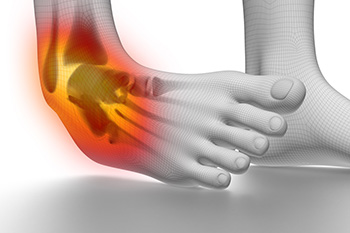
A high ankle sprain is an injury to the ligaments that connect the tibia and fibula, the two bones of the lower leg, just above the ankle joint. Unlike a regular ankle sprain, which affects the ligaments surrounding the ankle joint, a high ankle sprain involves the syndesmotic ligaments, which help stabilize the lower leg. This type of sprain is less common but often more severe, causing pain, swelling, and difficulty walking. High ankle sprains are typically caused by twisting or rotating the ankle, especially during sports activities like football, skiing, or basketball. A sudden force or impact, such as an awkward fall or tackle, can stretch or tear the ligaments. These sprains are often slow to heal and may require rest, or in severe cases, surgery for recovery. If you have sprained your ankle, it is suggested that you consult a podiatrist who can accurately diagnose and effectively treat ankle sprains.
Although ankle sprains are common, they aren’t always minor injuries. If you need your ankle injury looked at, contact one of our podiatrists from Ankle and Foot Centers of Missouri, P.C.. Our doctors can provide the care you need to keep you pain-free and on your feet.
How Does an Ankle Sprain Occur?
Ankle sprains are the result of a tear in the ligaments within the ankle. These injuries may happen when you make a rapid shifting movement while your foot is planted. A less common way to sprain your ankle is when your ankle rolls inward while your foot turns outward.
What Are the Symptoms?
- Pain at the sight of the tear
- Bruising/Swelling
- Ankle area is tender to touch
- In severe cases, may hear/feel something tear
- Skin discoloration
Preventing a Sprain
- Wearing appropriate shoes for the occasion
- Stretching before exercises and sports
- Knowing your limits
Treatment of a Sprain
In many cases, the RICE method (Rest, Ice, Compression, and Elevate) is used to treat ankle sprains. However, you should see a podiatrist to see which treatment option would work best with your injury. In severe cases, surgery may be required.
It is important to ask your doctor about rehab options after you receive treatment for your injury. Stretching, strength training, and balance exercises may help the ankle heal while also preventing further injury.
If you have any questions, please feel free to contact our offices located in the Greater Kansas City area . We offer the newest diagnostic and treatment technologies for all your foot care needs.
